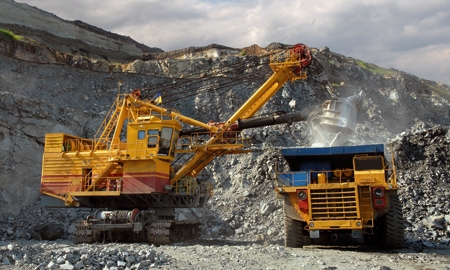
While Algeria’s oil and gas industry is a world player, the vast non-fuel mineral resources lying beneath the country’s surface remain largely unexploited. As Youcef Yousfi, Minister of Energy and Mines, puts it: “We are a mining country with a huge but under-developed mineral potential.”
Much of Africa’s largest country is yet to be explored, but it is known to contain deposits of prized commodities such as iron, zinc, lead, uranium, copper, gold and phosphates. Diamonds and other precious and semi-precious stones have also been found.
The mining sector has been open since 2001, and the government is keen to give it a fresh impetus by getting more international operators involved. A new development strategy is aimed at intensifying efforts to attract foreign investment and expertise, and build up the industry.
A more active and productive minerals sector would diversify Algeria’s economy and help meet rising domestic demand for construction and industrial materials, in addition to cutting the import bill and boosting export revenues.
“The mining potential of Algeria is significant but remains unknown, and despite the important efforts made by the state, the development of this potential has been very limited, while the national geological map has not been established,” says Mr. Yousfi.
“We have phosphates, iron, gold and other rare metals –
diamonds, too – and we are now in the process of examining potential sources. We have other minerals such as manganese, lead and zinc that we intend to exploit in a rational way.”
“We have some great deposits, the full economic potential Farid Benhadji, CEO of Manal |
Foreign partnerships
Major mining operations currently under way in Algeria include ENOR, a joint venture to develop the Tirek and Amesmessa gold deposits that combines the expertise of the U.K.-based GMA Resources, the state-owned energy company Sonatrach, and Gold Mines of Algeria. Also, Terramin Australia has teamed with Algerian company ENOF and the Office National de Recherche Geologique et Miniere (ORGM) to develop the zinc and lead deposits at Oued Amizour.
Rising commodity prices have prompted foreign companies to look to Africa for new sources of raw materials. In Algeria, this interest has come mainly from Australian and Chinese companies.
“In Algeria, we have not yet experienced the involvement of European or American companies who might benefit from coming here,” says Mr. Benhadji. “To attract these companies, we need to prove that we have world-scale deposits. People will not come here just to make $1 million per year. If they do not make a turnover of $20 or $30 million, they will not come.”
He acknowledges that development of the sector will take time. “The mining world moves very slowly. We must build relationships based on trust, otherwise it will never work,” he says.
Many of Algeria’s mineral deposits are located in remote areas lacking in transport infrastructure.
Competitive advantages
On the plus side is proximity to Europe, the country’s main customer for minerals, as well as low labor costs and the government’s readiness to support companies willing to invest.
Algeria’s mining law guarantees equal treatment for all investors, allows for the separation of surface and underground mine ownership, and enshrines the right of appeal to international arbitration in the event of dispute. There are incentives for investors importing equipment, as well as advantages concerning transfer of invested revenues, exemption from custom tax and royalties, amortization, and rebates on royalties.
Phosphates are a good example of the potential yet to be fully exploited. Algeria is currently a minor supplier of phosphates, but its reserves are currently estimated at around 2 billion tons.
The government wants exports of phosphates to rise from single figures to 30 million tons a year by 2020. This would make Algeria the third largest phosphate producer in the world, after the United States and China. The authorities estimate sales could generate $7-8 billion a year.
“We are currently looking for partners,” says Mr. Benhadji. “The original plan is to establish three phosphoric acid units, and then see if we can expand the project together. We are ready to discuss it, and even adjust the size of the project if necessary. Our closest competitors are Morocco and Tunisia, but we have gas and lower production costs.”
A mining institute has been established to train the technicians and the engineers the country needs.
“We are aware that we need to send people abroad to improve their skills and abilities,” says Mr. Benhadji. “We want to help rebuild the sector. There is great potential, but it requires knowledge.”
0 COMMENTS